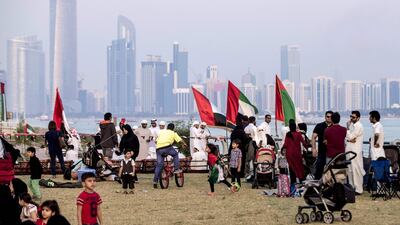The UAE is preparing to launch VAT in 2018. The headline motivation - which has earned the endorsement of many leading global organisations, such as the IMF - is that the tax will diversify public revenues.
Oil represents around 80 per cent of the government’s income, making it highly volatile, which in turns impedes long-term investment. Will VAT help diminish the dependence of state finances upon the “black gold”?
In terms of simple accounting, then the answer is surely “yes”: VAT is likely to generate considerable revenues (although making a precise estimate is treacherously difficult due to the policy’s unprecedented nature), in a time when oil revenues are quite stable.
However, the problem with simple accounting is it treats the economy as the arithmetic sum of various sectors and ignores the deep-seated interdependencies that exist between different types of economic activity. This crucial point merits elucidation.
Suppose that the government currently earns US$80 from oil, and $20 from other sources (these are implausibly small figures, but they are good for an example), reflecting oil’s 80 per cent contribution to the budget. After VAT, the government earns an additional $20, meaning that oil now only represents 67 per cent of total revenues. Accountants would proclaim: “mission accomplished”, as a $10 decrease in oil revenues would previously have meant a 10 per cent decrease in total revenues, whereas now, it only represents a 8.3 per cent decrease.
This simple calculation, however, assumes that the $10 decline in oil revenues has no impact on the rest of the economy. Given the way the UAE economy works - and how all economies work, in fact - this assumption may be quite misleading. To see why, note that VAT is applied to hotel services, including conference hosting services. When oil revenues fall, the government is likely to respond by trimming expenditure, including how much ministries spend on events in hotels, leading to a concomitant decrease in VAT revenues, too.
Thus, taxing an activity that is downstream of an activity that is itself dependent upon oil revenues blunts efforts at diversification. Effective diversification requires the taxation of activities that are independent of oil, or, preferably, that move counter-cyclically. For example, when oil prices fall due to a weakening of the global economy, gold prices tend to rise as it is considered a safe haven; therefore, investments by the sovereign wealth fund in gold mines - and the taxation thereof - will constitute successful diversification.
This simple accounting problem is not caused by accountants; it is the result of asking accountants the wrong question. Instead of enquiring: “What percentage of revenues are accounted for by oil?” we should be asking: “What happens to total government revenues when oil revenues decline by one dollar?” Answering this latter question is substantially more difficult, but it is much more informative for a government seeking to diversify.
_________________
Read more:
Economics 101: Is Saudi Arabia right to pursue austerity?
Economics 101: Do wars ever make economic sense?
Economics 101: What lies behind the Arabian Gulf states’ appetite for mega projects?
_________________
In the specific case of the UAE, to what extent will VAT represent a diversification of revenues, vis-à-vis merely an increase in indirectly procured oil revenues? Economists, including various experts working in the UAE Government, build complex models of the economy to answer questions such as this. Their results are not typically released to the general public, primarily because the models are proprietary assets, due to their sophistication. Moreover, until VAT actually goes into effect, and crucial data become available, many of the modelling assumptions will be quite arbitrary.
Nevertheless, we can be pretty confident in two things.
First, VAT will offer some diversification of government income, especially in light of the genuine diversity exhibited by the economy of Dubai. For example, falling oil prices lead to lower air fares, meaning greater demand for international travel, thereby boosting multiple sectors in Dubai’s economy, and the associated VAT earnings.
Second, VAT will offer less diversification than basic accounting would suggest. Many important sectors in the UAE are indirectly dependent upon oil, meaning that a contraction in the price of oil will lead to a parallel decline in VAT earnings in those sectors. For example, falling oil prices have decreased the Saudi government’s propensity to give bonuses to its public sector employees, and to hire people, meaning that the disposable income of Saudi Arabians has declined. Saudis are a key component of tourists in the UAE, meaning that VAT earnings from restaurants frequented by Saudis will suffer whenever oil prices fall.
Admittedly, because the effects of the sectoral interlinkages take time to surface, VAT income can be more stable than direct oil income, which is also one of the motivating factors cited by the UAE Government. However, it is worth noting that there are alternatives, most notably international credit markets. The UAE has an excellent credit rating of Aa2, with a stable outlook. It is possible that the Government sensed the end of the recent, protracted era of low interest rates, and preferred to pursue domestic income alternatives to debt markets. Yet this has to be balanced against the non-trivial cost of implementing VAT, both for the Government and small businesses.
Ultimately, however, beyond financial and diversification considerations, the UAE Government was likely aware that virtually all advanced economies have advanced tax systems in place, and that the UAE’s time has come.
Omar Al-Ubaydli (@omareconomics) is a researcher at Derasat, Bahrain.


